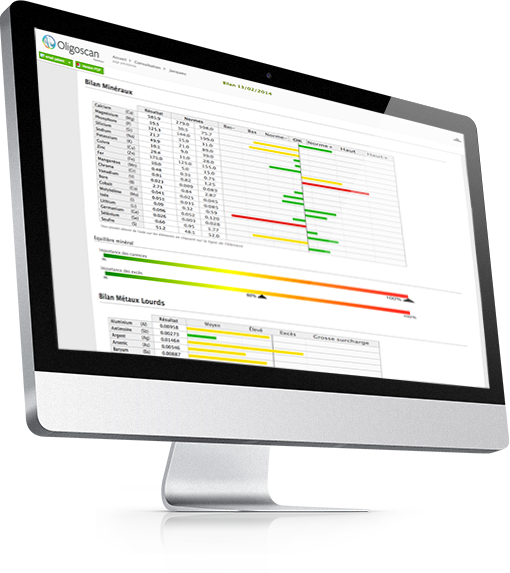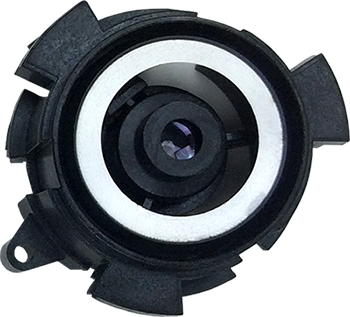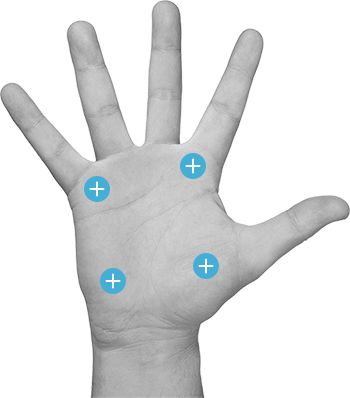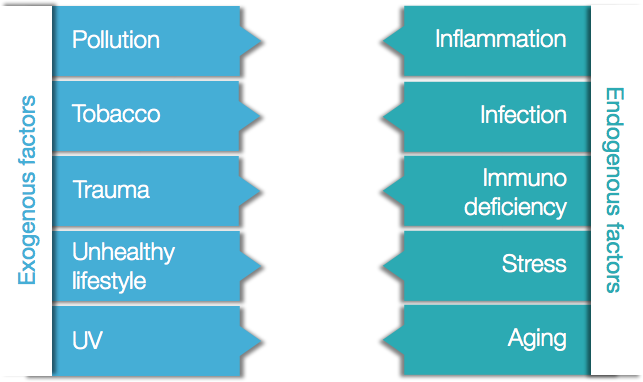Oligoscan is an innovative medical device
Physiological imbalance screening. Non-invasive, no blood test needed.
Learn moreOligoscan easy to use
A quick evaluation of minerals and toxic metals in the palm of the hand.
Learn moreScreening of physiological imbalances helps better health control and trace minerals overall wellbeing.

Excess and deficiency in minerals
A risk of toxic metals poisoning
Responsible for aging and numerous other diseases
Instant measurements of minerals, trace elements, oxidative stress and toxic metals.
Oligoscan can be used by all health specialists allowing for rapid and pain free analysis.
The measurement is taken directly by a portable spectrometer connected to a computer
The technology is based on spectroscopy
Evaluation of trace minerals reserves, the level of oxidative stress and toxic metals
Non-invasive measurement taken in situ
The record provided allows for detection of trace elements and minerals deficiencies as well as high rate of toxic metals in the body.
Oligoscan is now used by health professionals in many countries as a solution whenever a quick and accurate analysis of the level of trace elements, minerals and toxic metals is needed.
The Oligoscan uses optical technology : spectrophotometry.

This is a quantitative analytical method of measuring the absorption or the optical density of a chemical.
It is based on the principle of absorption, transmission or reflection of light by the chemical compounds over a certain wavelength range.
Spectrophotometry is used in many areas : chemicals, pharmaceuticals, environment, food, biology, medical / clinical, industrial and others.
In the medical field, spectrophotometry is used to examine blood or tissue.
The Oligoscan is a reliable and scientifically proven tool..
A set of tests and comparative studies have been made by researchers highlighting a correlation between the results of the Oligoscan and those performed in the laboratory.

Minerals and anti-oxidants are necessary for the proper functioning of the body. Accumulation of toxic metals can lead to health risks.
Minerals (macronutrients and micronutrients) have a key role in the proper functioning of the body. A daily intake of nutritional supplements is essential since the human body is unable to synthesize them itself.
Therefore, a deficiency in trace elements and minerals is one of the major factor for poor performance, tiredness, vulnerability to stress, decreased concentration or intellectual capacity, etc. It is, therefore, important to control the mineral level in the body to be able to anticipate the associated risks.
Studies by the WHO or FAO have highlighted the increasing dangers of massive exposure to toxic agents. Transmitted by air pollution, ground water and soil, food, etc. contamination is becoming increasingly dangerous and unavoidable involving health risks.
Toxic metals cause oxidative stress.
Oxidative stress is a type of aggression of the cell components by free radicals.
Oxidative stress is responsible for aging and many other diseases.

Free radicals are molecules produced in small amounts by the body. These free radicals are very reactive substances, capable of damaging the components of the cells (enzyme proteins, lipid membranes, DNA).
Their production is particularly stimulated by the exposure to sunlight (UV), tobacco, pollution, pesticides, etc.
A diet rich in antioxidants, particularly found in some fruits and vegetables, is essential in fighting free radicals.
Some scientific references :
The most frequent questions and answers :